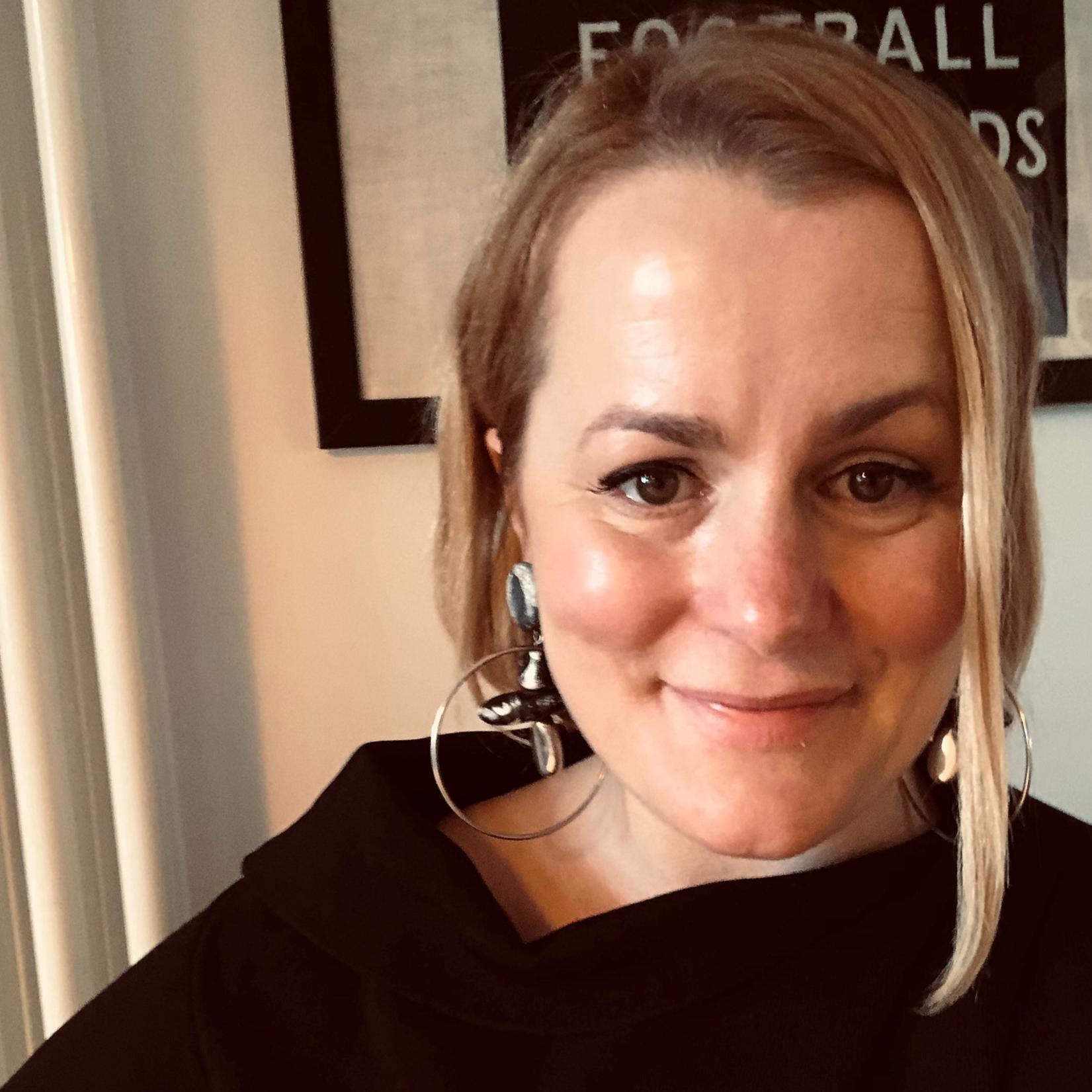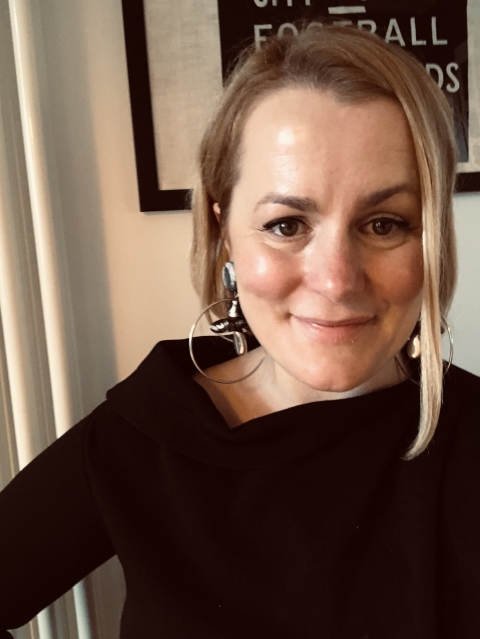Staff profile
Professor Angela Woods
Professor of Medical Humanities

| Affiliation | Telephone |
|---|---|
| Professor of Medical Humanities in the Department of English Studies | +44 (0) 191 33 48145 |
| Associate in the Department of Philosophy | |
| Director of the Discovery Research Platform for Medical Humanities and Director in the Institute for Medical Humanities | +44 (0) 191 33 48145 |
Biography

I am a medical humanities researcher with research interests and expertise spanning three linked areas: the interplay between clinical, experiential and cultural-theoretical accounts of voice-hearing and psychosis; narrative and its role in understanding health; and the dynamics of interdisciplinary and collaborative research.
I am the Director of Durham's Institute for Medical Humanities and the Director of the Discovery Research Platform for Medical Humanities, funded by a £9.5m Wellcome Trust award (2023-2030). From 2012-2022 I was Co-Director of Hearing the Voice, a decade-long interdisciplinary study of voice-hearing also funded by the Wellcome Trust.
I completed my PhD in Literary and Cultural Studies at the University of Melbourne, where I also lectured in Postmodernism and was the lead curriculum designer of Australia's first interdisciplinary coursework degree for doctoral students. I joined Durham University's Centre for Medical Humanities in 2010 and until August 2016 was based in the School of Medicine Pharmacy and Health.
I am founding editor of The Polyphony and a Series Editor for Bloomsbury's Critical Interventions in the Medical and Health Humanities book series. I have previously served as Associate Editor of the BMJ Medical Humanities Journal, and as academic lead for the world's first major exhibition on voice-hearing, Hearing Voices: Suffering, Inspiration and the Everyday.
I am an experienced supervisor of interdisciplinary doctoral and postdoctoral projects and have co-supervised researchers based in Psychology, Geography, Anthropology, Philosophy, Education and English Studies, as well as in clinical practice. I currently co-supervise three PhD students: Katharine Cheston, who is studying women’s experiences of the shame and stigma of living with complex, poorly-understood medical conditions; Ariel Swyer, who is examining non-clinical voice-hearing in the context of voice hearers’ lives; and Georgia Poplett, whose thesis combines creative and critical approaches to writing the lived experience of postpartum psychosis.
Unfortunately I will not be in a position in 2023-24 to support new PhD or Postdoctoral Fellowship applications.
Research interests
- Critical Medical Humanities
- Voice-Hearing - Phenomenology
- Voice-Hearing - Hermeneutics
- Narrative approaches to mental health
- Interdisciplinary Research & Practice
Esteem Indicators
- 2020: Series Editor, Bloomsbury's Critical Interventions in the Medical and Health Humanities:
- 2019 - 2023: Chair, Wellcome Trust Medical Humanities Interview Committee:
- 2015 - 2019: Welcome Trust Medical Humanities Early Career Expert Review Group:
- 2015 - 2016: Wellcome Trust Seed Committee Humanities and Social Sciences:
- 2014 - 2019: Associate Editor, BMJ Medical Humanities Journal:
- 2013 - 2017: Visiting Faculty, Rutgers Doctorate of Clinical Social Work:
Publications
Authored book
- The Sublime Object of Psychiatry: Schizophrenia in Clinical and Cultural TheoryWoods, A. (2011). The Sublime Object of Psychiatry: Schizophrenia in Clinical and Cultural Theory. Oxford University Press.
Book review
- Book Review. Medicine, Health and the Arts: Approaches to the Medical Humanities. Edited by Victoria Bates, Alan Bleakley, Sam Goodman. Published by Routledge, 2013, hardback, 304 pages. ISBN 978-0415644310, £84.99Woods, A. (2014). Book Review. Medicine, Health and the Arts: Approaches to the Medical Humanities. Edited by Victoria Bates, Alan Bleakley, Sam Goodman. Published by Routledge, 2013, hardback, 304 pages. ISBN 978-0415644310, £84.99. Medical Humanities., 40(2), 146-148. https://doi.org/10.1136/medhum-2014-010500
- Book review: Matti Hyvarinen, Lars-Christer Hyden, Maria Saarenheimo and Maria Tamboukou, Beyond narrative coherence: an introductionWoods, A. (2013). Book review: Matti Hyvarinen, Lars-Christer Hyden, Maria Saarenheimo and Maria Tamboukou, Beyond narrative coherence: an introduction. Qualitative Research, 13(2), 246-248. https://doi.org/10.1177/1468794112442920
Chapter in book
- Literature in Collaboration: The Work of Literature in the Critical Medical HumanitiesWoods, A., & Rákóczi, J. (2024). Literature in Collaboration: The Work of Literature in the Critical Medical Humanities. In A. M. Elsner & M. Pietrzak-Franger (Eds.), Literature and Medicine (pp. 357-374). Cambridge University Press. https://doi.org/10.1017/9781009300070.025
- IntroductionWhitehead, A., & Woods, A. (2016). Introduction. In A. Whitehead, A. Woods, S. Atkinson, J. Macnaughton, & J. Richards (Eds.), The Edinburgh companion to the critical medical humanities. (pp. 1-31). Edinburgh University Press.
- Beyond the Wounded Storyteller: Rethinking Narrativity, Illness and Embodied Self-ExperienceWoods, A. (2012). Beyond the Wounded Storyteller: Rethinking Narrativity, Illness and Embodied Self-Experience. In H. Carel & R. Cooper (Eds.), Health, illness and disease: philosophical essays. (pp. 113-128). Acumen Publishing.
- Mathematics <> Masculinity <>MadnessWoods, A. (2012). Mathematics <> Masculinity <>Madness. In G. Araoz (Ed.), Madness in context : historical, poetic and artistic narratives. Interdisciplinary Press.
Edited book
- The Edinburgh Companion to the Critical Medical Humanities.Whitehead, A., Woods, A., Atkinson, S., Macnaughton, J., & Richards, J. (Eds.). (2016). The Edinburgh Companion to the Critical Medical Humanities. Edinburgh University Press.
Journal Article
- The Long or the Post of It? Temporality, Suffering, and Uncertainty in Narratives Following COVID-19Cheston, K., Cenedese, M., & Woods, A. (2025). The Long or the Post of It? Temporality, Suffering, and Uncertainty in Narratives Following COVID-19. Journal of Medical Humanities, 46, 3–20. https://doi.org/10.1007/s10912-023-09824-y
- “Distress is probably the wrong word”: exploring uncertainty and ambivalence in non-clinical voice-hearing and the psychosis continuumSwyer, A., Woods, A., Ellison, A., & Alderson-Day, B. (2024). “Distress is probably the wrong word”: exploring uncertainty and ambivalence in non-clinical voice-hearing and the psychosis continuum. Psychosis. Advance online publication. https://doi.org/10.1080/17522439.2024.2407138
- History at the heart of medicineMcGuire, C., & Woods, A. (2024). History at the heart of medicine. Wellcome Open Research, 9(249). https://doi.org/10.12688/wellcomeopenres.21229.1
- Spiritually significant hallucinations: a patient-centred approach to tackle epistemic injusticeCullinan, R. J., Woods, A., Barber, J. M., & Cook, C. C. (2023). Spiritually significant hallucinations: a patient-centred approach to tackle epistemic injustice. BJPsych Bulletin, 48(2), 133-138. https://doi.org/10.1192/bjb.2023.17
- Corpus linguistics and clinical psychology: Investigating personification in first-person accounts of voice-hearingCollins, L., Brezina, V., Demjén, Z., Semino, E., & Woods, A. (2023). Corpus linguistics and clinical psychology: Investigating personification in first-person accounts of voice-hearing. International Journal of Corpus Linguistics, 28(1), 28-59. https://doi.org/10.1075/ijcl.21019.col
- Hearing spiritually significant voices: A phenomenological survey and taxonomyCook, C. C., Powell, A., Alderson-Day, B., & Woods, A. (2022). Hearing spiritually significant voices: A phenomenological survey and taxonomy. Medical Humanities., 48(3), 273-284. https://doi.org/10.1136/medhum-2020-012021
- Voice-hearing across the continuum: a phenomenology of spiritual voicesMoseley, P., Powell, A., Woods, A., Fernyhough, C., & Alderson-Day, B. (2022). Voice-hearing across the continuum: a phenomenology of spiritual voices. Schizophrenia Bulletin, 48(5), 1066-1074. https://doi.org/10.1093/schbul/sbac054
- “Figuring out how to be normal”: Exploring how young people and parents make sense of voice‐hearing in the family contextMayer, C., Dodgson, G., Woods, A., & Alderson‐Day, B. (2022). “Figuring out how to be normal”: Exploring how young people and parents make sense of voice‐hearing in the family context. Psychology and Psychotherapy: Theory, Research and Practice, 95(2), 600-614. https://doi.org/10.1111/papt.12381
- The Recovery Narrative: Politics and Possibilities of a GenreWoods, A., Hart, A., & Spandler, H. (2022). The Recovery Narrative: Politics and Possibilities of a Genre. Culture, Medicine and Psychiatry, 46(2), 221-247. https://doi.org/10.1007/s11013-019-09623-y
- Voice-Hearing and Personification: Characterizing Social Qualities of Auditory Verbal Hallucinations in Early PsychosisAlderson-Day, B., Woods, A., Moseley, P., Dodgson, G., Deamer, F., Common, S., & Fernyhough, C. (2021). Voice-Hearing and Personification: Characterizing Social Qualities of Auditory Verbal Hallucinations in Early Psychosis. Schizophrenia Bulletin, 47(1), 228-236. https://doi.org/10.1093/schbul/sbaa095
- ‘I’ve learned I need to treat my characters like people’: Varieties of agency and interaction in Writers’ experiences of their Characters’ VoicesFoxwell, J., Alderson-Day, B., Fernyhough, C., & Woods, A. (2020). ‘I’ve learned I need to treat my characters like people’: Varieties of agency and interaction in Writers’ experiences of their Characters’ Voices. Consciousness and Cognition, 79, Article 102901. https://doi.org/10.1016/j.concog.2020.102901
- A linguistic approach to the psychosis continuum: (dis)similarities and (dis)continuities in how clinical and non-clinical voice-hearers talk about their voicesCollins, L. C., Semino, E., Demjén, Z., Hardie, A., Moseley, P., Woods, A., & Alderson-Day, B. (2020). A linguistic approach to the psychosis continuum: (dis)similarities and (dis)continuities in how clinical and non-clinical voice-hearers talk about their voices. Cognitive Neuropsychiatry, 25(6), 447-465. https://doi.org/10.1080/13546805.2020.1842727
- On shame and voice-hearingWoods, A. (2017). On shame and voice-hearing. Medical Humanities., 43(4), 251-256. https://doi.org/10.1136/medhum-2016-011167
- Interdisciplinary collaboration in action: tracking the signal, tracing the noiseCallard, F., Fitzgerald, D., & Woods, A. (2015). Interdisciplinary collaboration in action: tracking the signal, tracing the noise. Palgrave Communications., 1. https://doi.org/10.1057/palcomms.2015.19
- Critical Medical Humanities: Embracing Entanglement, Taking RisksViney, W., Callard, F., & Woods, A. (2015). Critical Medical Humanities: Embracing Entanglement, Taking Risks. Medical Humanities., 41(1), 2-7. https://doi.org/10.1136/medhum-2015-010692
- Experiences of hearing voices: analysis of a novel phenomenological surveyWoods, A., Jones, N., Alderson-Day, B., Callard, F., & Fernyhough, C. (2015). Experiences of hearing voices: analysis of a novel phenomenological survey. The Lancet Psychiatry, 2(4), 323-331. https://doi.org/10.1016/s2215-0366%2815%2900006-1
- Interdisciplinarity as Cognitive Integration: Auditory verbal Hallucinations as a Case studyBernini, M., & Woods, A. (2014). Interdisciplinarity as Cognitive Integration: Auditory verbal Hallucinations as a Case study. Wiley Interdisciplinary Reviews: Cognitive Science, 5(5), 603-612. https://doi.org/10.1002/wcs.1305
- Better Than Mermaids and Stray Dogs? Subtyping Auditory Verbal Hallucinations and Its Implications for Research and PracticeMcCarthy-Jones, S., Thomas, N., Strauss, C., Dodgson, G., Jones, N., Woods, A., Brewin, C., Hayward, M., Stephane, M., Barton, J., Kingdon, D., & Sommer, I. (2014). Better Than Mermaids and Stray Dogs? Subtyping Auditory Verbal Hallucinations and Its Implications for Research and Practice. Schizophrenia Bulletin, 40(Suppl 4), S275-S284. https://doi.org/10.1093/schbul/sbu018
- Interdisciplinary Approaches to the Phenomenology of Auditory Verbal HallucinationsWoods, A., Jones, N., Bernini, M., Callard, F., Alderson-Day, B., Badcock, J., Bell, V., Cook, C., Csordas, T., Humpston, C., Krueger, J., Larøi, F., McCarthy-Jones, S., Moseley, P., Powell, H., Raballo, A., Smailes, D., & Fernyhough, C. (2014). Interdisciplinary Approaches to the Phenomenology of Auditory Verbal Hallucinations. Schizophrenia Bulletin, 40(Suppl 4), S246-S254. https://doi.org/10.1093/schbul/sbu003
- Culture and Hallucinations: Overview and Future DirectionsLarøi, F., Luhrmann, T., Bell, V., Christian, W., Deshpande, S., Fernyhough, C., Jenkins, J., & Woods, A. (2014). Culture and Hallucinations: Overview and Future Directions. Schizophrenia Bulletin, 40(Suppl 4), S213-S220. https://doi.org/10.1093/schbul/sbu012
- Report on the 2nd International Consortium on Hallucination Research: Evolving Directions and Top-10 “Hot Spots” in Hallucination ResearchWaters, F., Woods, A., & Fernyhough, C. (2014). Report on the 2nd International Consortium on Hallucination Research: Evolving Directions and Top-10 “Hot Spots” in Hallucination Research. Schizophrenia Bulletin, 40(1), 24-27. https://doi.org/10.1093/schbul/sbt167
- Rethinking “Patient Testimony” in the Medical Humanities: The Case of Schizophrenia Bulletin’s First Person AccountsWoods, A. (2013). Rethinking “Patient Testimony” in the Medical Humanities: The Case of Schizophrenia Bulletin’s First Person Accounts. Journal of Literature and Science., 6(1), 38-54. https://doi.org/10.12929/jls.06.1.03
- The Voice-HearerWoods, A. (2013). The Voice-Hearer. Journal of Mental Health, 22(3). https://doi.org/10.3109/09638237.2013.799267
- The Limits of Narrative: Provocations for the Medical HumanitiesWoods, A. (2011). The Limits of Narrative: Provocations for the Medical Humanities. Medical Humanities., 37(2), 73-78. https://doi.org/10.1136/medhum-2011-010045
- 'I suffer in an unknown manner that is hieroglyphical’. Jung and Babette en route to Freud and SchreberWoods, A. (2011). ’I suffer in an unknown manner that is hieroglyphical’. Jung and Babette en route to Freud and Schreber. History of the Present, 1(2), 244-258. https://doi.org/10.5406/historypresent.1.2.0244
- Memoir and the Diagnosis of Schizophrenia: Reflections on The Centre Cannot Hold; Me, Myself, and Them; and the ‘Crumbling Twin Pillars’ of Kraepelinian PsychiatryWoods, A. (2011). Memoir and the Diagnosis of Schizophrenia: Reflections on The Centre Cannot Hold; Me, Myself, and Them; and the ‘Crumbling Twin Pillars’ of Kraepelinian Psychiatry. Mental Health Review Journal, 16(3), 102-106. https://doi.org/10.1108/13619321111178041
- Post-Narrative: An AppealWoods, A. (2011). Post-Narrative: An Appeal. Narrative Inquiry, 21(2), 399-406. https://doi.org/10.1075/ni.21.2.20woo

